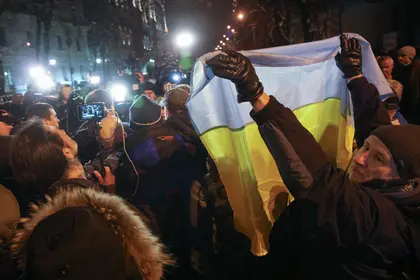Former Odesa Oblast Governor and ex-Georgian President Mikheil Saakashvili has been deported to Poland, a State Border Service spokesman said on the evening of Feb. 12.
Saakashvili was arrested in a downtown Kyiv restaurant earlier in the day, with footage of the arrest quickly circulating on the internet.
JOIN US ON TELEGRAM
Follow our coverage of the war on the @Kyivpost_official.
Video footage from the cafe shows Saakashvili being brutally brought out of the cafe by armed men and taken by the hair. Saakashvili’s press office said the armed men had hit him in the face, threatened to shoot at him and put him down on the floor of a bus.
- Obtain the freshest war in ukraine update from the Kyiv Post's daily news coverage today.
- Examine the most contemporary Ukraine news that came out today.
Saakashvili is arrested in a Kyiv cafe on Feb. 12.
Saakashvili’s deportation comes after a series of Ukrainian court rulings against the former governor, who was stripped of his Ukrainian citizenship last year after a falling out with President Petro Poroshenko.
State Border Service spokesman Oleh Slobodyan confirmed on his Facebook page that Saakashvili was arrested by the agency’s officers, the State Migration Service and regular police officers. He said Saakashvili was sent “to the country from which he came,” likely a reference to the Georgian politician’s September 2017 crossing of the Ukrainian border with Poland.
Slobodyan added that Saakashvili was deported because the Ukrainian courts refused to grant him refugee status.
It was not immediately clear when the 50-year-old former Georgian president left Ukraine.
In the immediate aftermath of his arrest, Saakashvili’s political party issued a statement claiming that “unknown persons in masks have captured and taken Mikheil Saakashvili to an unknown location.”
A Security Service of Ukraine (SBU) spokeswoman denied that the SBU was involved in Saakashvili’s detention. A spokeswoman for the General Prosecutor’s Office said that “today’s events relating to Saakashvili are outside the purview of the General Prosecutor of Ukraine.”
The men who arrested Saakashvili had the insignia of State Border Service, Vladimir Fedorin, Saakashvili’s ally, who was present at the spot of the arrest, told the Kyiv Post.
Saakashvili supporters fear he might be deported from Ukraine later the day. Some of them have already headed to block Kyiv airports, a source in Saakashvili’s party told the Kyiv Post.
Reuters reported that the “kidnappers” traveled in “three white minivans.”
Ukrainian media agencies reported earlier that Saakashvili could be sent to Poland or the Netherlands. Dutch Foreign Minister Halbe Zijlstra said in December 2017 that the Netherlands had approved a request to provide Saakashvili with a visa.
“He is married to a Dutch woman and if he applies for a passport it is possible under Dutch law,” Zijlstra said. His wife is Sandra Elisabeth Roelofs–Saakashvili. The Dutch Embassy in Kyiv declined to comment.
At 6:12 Kyiv time Saakashvili’s ally David Sakvarelidze posted on his Facebook that he had received a phone call from Saakashvili from Warsaw.
Saakashvili said that Poland had only agreed to accept him if he arrived voluntarily but he had told Polish authorities he had been brought to the country by force, and violence had been used against him.
The Kyiv Administrative Court of Appeal on Feb. 5 rejected Saakashvili’s political asylum appeal, potentially opening a way for his deportation or extradition from Ukraine.
Saakashvili’s lawyers have argued that their client could not be legally deported or extradited regardless of his asylum status, since it is unlawful to deport or extradite permanent stateless residents of Ukraine. Saakashvili also could not be extradited or deported under the law because he was under investigation in a criminal case in Ukraine, they said.
Forced deportation or extradition is only possible under Ukrainian law if there is a specific court warrant for deportation or extradition. Even in that case, such a ruling can be appealed against within 30 days, and extradition or deportation can only happen after the appeals court has made its ruling.
There has been no court ruling on Saakashvili’s deportation, however, despite the fact that forced deportation without a court warrant is banned by the law.
Saakashvili’s deportation or extradition would also be illegal during the next appeal stage because his lawyers have filed an appeal against the Feb. 5 ruling on asylum with the Supreme Court and because his current residence permit from the State Migration Service is valid until March 1, Saakashvili’s lawyer Ruslan Chernolutsky said on Feb. 6.
Saakashvili and his supporters also argued that he could not be expelled from the country because the cancellation of his Ukrainian citizenship by Poroshenko in July contradicted Ukrainian and international law, the Constitution and due process. His lawyers said that his extradition or deportation was impossible before a court decided on the legality of the cancellation of his citizenship.
In October and November, seven Georgian associates of Saakashvili were deported to Georgia by Ukrainian authorities without court warrants, with the Georgians claiming they had been kidnapped and beaten.
Human Rights Ombudsman Valeria Lutkovska said in November that three of the Georgians had been illegally kidnapped and deported by the National Police without court warrants. The authorities denied accusations of wrongdoing, but failed to present the legal grounds for the deportations.
Read the background story here
Staff writers Oksana Grytsenko and Yuliana Romanyshyn contributed to this report.
Footage from ex-Georgian President Mikheil Saakashvili’s Facebook page shows police officers arresting him at Suluguni restaurant in Kyiv at 10 Myzeiny Alley. Ukrainian authorities are seeking to deport him to Georgia after he became a critic of President Petro Poroshenko after leaving office as Odesa Oblast’s governor in November 2016.
You can also highlight the text and press Ctrl + Enter




